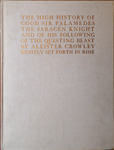100th
MP

|
THE
100th
MONKEY
PRESS |
|
|
|
Limited Editions by Aleister Crowley & Victor B. Neuburg |
|
Bibliographies |
|
Download Texts
»
Aleister
Crowley
WANTED !!NEW!!
|
|
GOOD SIR PALAMEDES |
|
Image Thumbnails |
||||||||||||||||||||||
|
Title: |
The High History of the Good Sir Palamedes the Saracen Knight and of his Following of the Questing Beast. |
|
||||||||||||||||||||
|
Variations: |
|
|||||||||||||||||||||
|
Publisher: |
Wieland and Co., 3 Great James St., Bedford Row, London.3 |
|||||||||||||||||||||
|
Printer: |
|
|||||||||||||||||||||
|
Published At: |
London.1 |
|||||||||||||||||||||
|
Date: |
12 June 1912.1 |
|||||||||||||||||||||
|
Edition: |
1st Edition. |
|||||||||||||||||||||
|
Pages: |
viii + 113.1 |
|||||||||||||||||||||
|
Price: |
Priced at 5 shillings.3 |
|||||||||||||||||||||
|
Remarks: |
Dedicated to Allan Bennett.3 |
|||||||||||||||||||||
|
Pagination:2 |
|
|||||||||||||||||||||
|
Contents: |
|
|||||||||||||||||||||
|
Author’s Working Versions: |
|
|||||||||||||||||||||
|
Other Known Editions: |
|
|||||||||||||||||||||
|
Bibliographic Sources: |
|
|
||||||||||||||||||||
|
Comments by Aleister Crowley: |
Sir Palamedes was the most ambitious attempt to describe the Path of the Wise as I knew it. It is in its way almost complete, but there is no attempt to show the necessary sequence of the ordeals described in each section. The last section, in which Sir Palamedes, after achieving every possible task and finding that all his attainments did not bring him to the end of his Quest, abandons the following of the Questing Beast; he returns, discomfited, to the Round Table, only to find that, having surrendered, the Questing Beast comes to him of its own accord. I could not pretend that this was more than a tour de force, an evasion of the issue. I know now that the true solution is this: there is no goal to be attained, as I had reached Madrid; the reward is in the march itself. As soon as I got to Madrid my adventures were at an end. If I had had to stay there I should have been bored to death, even if it had been the city of God itself. The joy of life consists in the exercise of one’s energies, continual growth, constant change, the enjoyment of every new experience. To stop means simply to die. The eternal mistake of mankind is to set up an attainable ideal. Sir Palamedes expressed himself fully in following the Questing Beast. His success (as described in the poem) would in reality have left him with nothing to live for. My own life has been indescribably ecstatic, because even when I thought that there was a reward and a rest at the end, my imagination pictured them as so remote that I was in no danger of getting what I wanted. I am now wise enough to understand that every beat of my pulse marks a moment of exquisite rapture in the consciousness that the curve of my career is infinite, that with every breath I climb closer and closer to the limit, yet can never reach it. I am always aspiring, always attaining; nothing can stop me, not even success. I had some perception of this in these years of my life in London, for I wrote in The Book of Lies: “Only those are happy who have desired the unattainable.” — The Confessions of Aleister Crowley. New York, NY. Hill and Wang, 1969. Pages 602-603 |
|||||||||||||||||||||
|
Reviews: |
WHAT shall be said of The Equinox? It is alarming indeed suddenly to chance upon it in the full bloom of its eighth year, a biannual published in March and September of some 800 pages the two issues, “The Official Organ of the A\A\”, “The Review of scientific illuminism”—so alarming that I hardly dare pronounce myself. And The Equinox would not concern THE POETRY REVIEW were it not for the open secret that The Equinox is the poet, Aleister Crowley. Poet I call him, particularly because I cannot consider him here in his capacity of (retiring) editor, or of Chancellor of the A\A\ The specific interest of his periodical must be that nine of its chief literary items are his, and that The High History of Good Sir Palamedes, besides many of his other works, first appeared in its pages. For purposes of review it may be hazarded roundly that the whole of The Equinox is a creation of the amazing Mr. Crowley. His antics are as wild as the devil’s, he dances through its pages like a mad magician. It is a sort of enchanted variety entertainment. I cannot discover when it is not serious. But there are moments when Mr. Crowley is serious, the moments of such passages as these (in the drama “Adonis”):
Astarte. Nay, never wake! unless to catch my neck And break me up with kisses—never sleep, Unless to dream new pains impossible To waking! Girls! with more than dream’s address Wake him with perfume till he smile, with strokes Softer than moonbeams till he turn, and sigh, With five slow drops of wine between his lips Until his heart heave, with young thrills of song Until his eyelids open, and the first And fairest of ye greet him like a flower, So that awakened he may break from you And turn to me. . . .
But too often he is fooling—fooling us, fooling himself, fooling life, fooling death, and what he cannot fool he fools for not being foolable. Unfortunately, only four of his contributions to the present issue are in verse; I must not fail, however, to draw attention to one of the two fine plays that happen to be written in prose. “The Ghouls” is possibly the most ghastly death-dance in English literature. If Oscar Wilde had written it (but he could not have) every one would know it. It is the very pith and marrow of terror. Cynical it may be, indecent it may be, but I defy the lord of dreams to send any more plutonian nightmare to haunt our mortal sleep. Mr. Crowley plies the knack of writing as if he would have us believe he can make poetry, but, for some reason, does not wish to make it. It is hard to tell whether he thinks all his readers inevitably such fools that it cannot be worth while to give them true sense; or whether he is but praising the old ruse of covering an inability to be serious by the pretence of preferring to be flippant. Superficially speaking, The High History of Good Sir Palamedes is something between The Hunting of the Snark and Don Quixote without the particular individual qualities of either; but, seriously speaking, it is a religious poem, and a great work of art. Again superficially speaking, it is the master-limerick of a buffoon; again, seriously speaking, it is the epic of the eternal seeker. Sir Palamedes, found the worthy and chosen knight for the adventure of the Questing Beast, searches the world for it; a hundred times thinks he has the clue, but a hundred times is baffled and cheated.
“Yea!” quoth the knight, “I rede the spell. This Beast is the Unknowable. I seek in Heaven, I seek in Hell. . .
I know him? Still he answers: No! I know him not? Maybe—and lo! He is the one sole thing I know!
There is plenty of fun and twaddle, entertaining or not, according to the disposition of the reader:
immeasurable, Incomprehensibundable, Unspeakable, inaudible.
Intangible, ingustable, Insensitive to human smell, Invariable, implacable,
Invincible, insciable, Irrationapsychicable, Inequilegijurable,
Immamemimomummable. Such is its nature. . . .
There are few passages of sustained poetry. Mr. Crowley has a fine power of swiftly combining the description of a situation with that of the emotions it provokes:
Hush! the heart’s beat! Across the moor Some dreadful god rides fast, be sure!
The listening Palamedes bites through His thin white lips—what hoofs are those? Are they the Quest? How still and blue The sky is! Hush—God knows—God knows!
Exhausted and frenzied with the quest, the knight at last attains the vision of Pan in a green valley. He regains strength and youth:
Sir Palamedes the Saracen Hath seen the All; his mind is set To pass beyond that great Amen.
And then, in a final effort upon the loftiest mountain top, he sees Nought, and even that is not the Beast.
“Faugh!” cried the knight. “ Thought, word, and act Confirm me. I have proved the quest Impossible. I break the pact.”
Returning to Camelot to announce his failure, he finds himself involved in a kind of miracle,
. . . . with vigour rude, The blast tore down the tapestry That hid the door. All ashen-hued
The knights laid hand to sword. But he (Sir Palamedes) in the gap Was found—God knoweth—bitterly Weeping. . . .
And there, in the Hall, the Beast comes nestling and fawning to him, and the assembled knights through him and with him attain the quest. Sir Palamedes is a “Fool of God”: a great, shy, strong, bungling creature, all instinct and impulse. His brain suffers terribly; the quest drives him temporarily mad:
The last bar breaks; the steel will snaps; The black hordes riot in his brain; A thousand threatening thunder-claps Smite him—insane—insane—insane!
His muscles roar with senseless rage; The pale kn ight staggers, deathly sick; Reels to the light that sorry sage, Sir Palamedes the Lunatick.
He becomes a fanatic; he performs outlandish rites, but:
O thou most desperate dupe that Hell’s Malice can make of mortal men! Meddle no more with magick spells, Sir Palamedes the Saracen!
Over and over again he turns philosopher; but his reasoning is always tinged with a delicious innocence. He is a poor, puzzled fellow; he must return to the conclusion:
Then, since the thinker must be dumb, At least the knight may knightly act: The wisest monk in Christendom May have his skull broke by a fact.
I have not quoted the best verses in the poem. They are difficult to extract from their context; I have tried rather to give the gist and scheme of the whole. Mr. Crowley is extraordinarily entertaining, and, of course, he is also much more than entertaining. Sir Palamedes, though probably not his best work, should on no account be missed. It is a work that superficial criticism might as easily compare to some of the productions of Byron, as overlook with a sneer. I doubt, in fact, whether the question of its place in literature is one to be decided by contemporary criticism at all. I, at any rate, will not commit myself to attempting a decision. —The Poetry Review, Harold Monro, September 1912. ______________________________
“The High History of Good Sir Palamedes, the Saracen Knight and of his following of the Questing Beast,” by Aleister Crowley. “Rightly set forth in Rime.” The popular myths and legends which had gathered round King Arthur and his famous knights, have ever been to poets and dramatists a favourite theme. The latest who has been allured by the old-world subject is the author of this “high history.” Mr. Crowley possessed many qualifications for the task of relating the fabulous deeds of “Sir Palamedes,” for the subtle beauty of his former poetic efforts, with its glowing passion and rich diction, had been freely admitted. The poet’s impassioned imagination and fancy move untrammeled throughout this metrical romance; and the volume merits recognition, especially from the lovers of English ballad poetry. The publishers have issued it in an appropriate form. —The Publishers' Circular, 20 July 1912. ______________________________
. . . Noble and beautiful poem. —The Occult Review, date unknown. ______________________________
It is impossible to read . . . without being impressed by the essential truth and beauty of the author’s spirit . . . written not as tasks are written, but from the fullness of the heart, passionately. In “Sir Palamedes” we have the history of a holy quest so treated that the theme becomes reconciled to universal experience. Sir Palamedes’ following of the Questing Beast is Everyman’s following; his failures and defeats are Everyman’s catastrophes; his victory, incomplete and without triumph yet fulfilled unto him for this faith’s sake, is the world-old victory of all those who, being heavy-laden, yet labour. —The Literary World, date unknown. ______________________________
Mr. Aleister Crowley has set his metrical skill to the congenial business of a rhyming symbolic legend. He has succeeded uncommonly well. The line runs easily; there is loads of colour and poetic force about it, and the atmosphere of a remote, almost religious purpose; while Mr. Crowley has kept a tight hold on the archaic diction, he has used it happily, and successfully avoided the tricks and conceits that one might have expected in such a venture. —The Manchester Guardian, date unknown. ______________________________
Much vigorous imagination. —The Times, date unknown. ______________________________
Mr. Crowley is an elvish and wayward mortal—if mortal he be. But is he? For our part, we refuse to be dragged into a public discussion of delicate family matters; suffice to say that his genius, be its origin celestial or infernal, is considerably to our liking; he can write angelic poetry and devilish good prose, a cloud of exotic scholarship trailing over the whole, and suffused, every now and then, by lightning-like gleams of mirth and snappiness. Quite a phenomenon, too, in the way of common sense, when the fit is on him. But Mortadello was spoilt, for all that. No wonder. The brandies as the Café Riche are responsible for more than one disaster. And then—why, why those Truffles? That was tempting papa Beelzebub. As to the good Sir Palamede, it makes the heart bleed to reflect that he might have learnt more in three minutes’ conversation with Mr. Crowley than in all those wonderings.
“To buss the wenches, pass the pot, Is now the enviable lot Of Palamede the Saracen!”
There you are! The intellectual life in a nutshell. And only think of all the pairs of sandals the old enthusiast wore out ere attaining that blissful state. So do many of us, more’s the pity. —The English Review, August 1912. |
|||||||||||||||||||||





